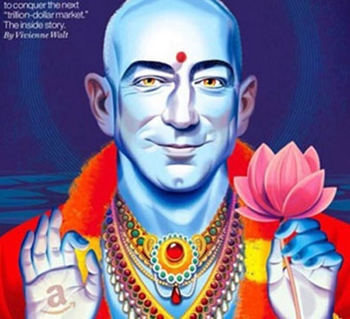New Delhi, Jan 13: Fortune Magazine cover page has shown Amazon CEO Jeff Bezos as a Hindu deity in its January issue, thus hurting the religious sentiments of the NRI community in US.

The US based magazine's cover story titled “Amazon Invades India,” is about the global e-commerce giant's penetration into the Indian market –one of the fastest growing markets for Amazon.
It may be recalled that India's legendary skipper Mahendra Singh Dhoni also courted controversy in 2013 for appearing in an advertisement on the cover of Business Today as Lord Vishnu holding a number of things.
A case has been registered against Dhoni under section 295 (injuring or defiling place of worship with intent to insult the religion of any class) along with 34 of the IPC.




Comments
If this continues people will forget the real picture of vishnu.
Jeff is the new avtaar of vishnu for western, many more avtaar will come in future.
Bhakths will be now like.. Ban amazon.. Uninstall amazon.. hahaha
ALLAH says in QURAN : O mankind! Worship you Lord (ALLAH) who created YOU and those were before YOU, so that you may become Al muttaqun (Pious).
When ALLAH says he is your LORD.. Intelligent person will try to look & learn what ALLAH says & VERIFIES what he says & if not confirmed he experiment what he Says.
BE one of this INTELLIGENT Person... U will be successful in the eyes of the one who gave LIFE & DEATH.
It is true it hurts our people.
Secondly : It is our Hindu brother's mistake, they are portraying God as men.
The God can not be like human being or any other creature.
The God is creator of everything and almighty. Then how can the God be given the picture of man.
If there is no picture, then nobody can play around with God.
God help us to understand you, your strength, your power and your guidance to all of us so that we succeed here and hereafter.
Add new comment